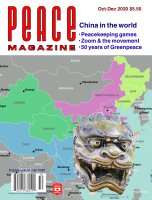The Uyghurs are a Turkic-language speaking Muslim people native to territory now in the northwest borderlands of the People’s Republic of China. About 12 million Uyghurs live in the PRC’s Xinjiang Uyghur Autonomous Region.
Xinjiang is located far from the Chinese capital—over 4,000 km or 38 hours by road away. The Uyghur city of Kashgar is geographically closer to Budapest than to Beijing.
The Uyghurs have a distinct identity based on a long history and civilizational tradition of religious philosophy, literature, music and fine Islamic art. They have very little in common with China’s majority nationality, the Han Chinese. Most Uyghurs would prefer political independence to the current oppressive rule of Xinjiang from Beijing. They call for a Uyghurstan, or the independent Uyghur nation they call East Turkestan, with its own star and crescent moon flag.
Far from Autonomous
The Xinjiang Uyghur Autonomous Region is a misnomer, as there is considerably less autonomy for this Uyghur region than for an ordinary Chinese province. The Chinese government actively seeks to suppress the Uyghur language and culture and increasingly limits freedom to practice Islam. Consequently, many mosques have closed and the ones that are open are used more as tourist attractions than as places of worship.
The PRC government seeks to impose the Chinese language and cultural norms and reduce the vibrant Uyghur culture to colourful costumes and folkloric singing and dancing. The Uyghurs are therefore more and more hostile to Chinese rule and resent that natural resources from their lands are shipped to the interior of China to the profit of non-Uyghur people.
Since the rise to power of Chinese Communist Party General Secretary Xi Jinping five years ago, the PRC has installed a dense network of cameras and listening devices throughout the Uyghur areas. Uyghur DNA and other biometric measures are used to oppressively monitor all Uyghurs. They are subject to frequent inspection at police checkpoints wherever they go. In addition, the Chinese government has established a program whereby Han Chinese officials are assigned to periodically live and sleep in Uyghur homes to “help” them.
Re-Education Camps
In 2017 satellite technology revealed the construction of an extensive network of prison facilities being constructed on a massive scale throughout Xinjiang.
Now over a million Uyghurs are incarcerated in these “re-education camps.” Their purpose is to impose the Mandarin Chinese language and suppress religious practice on proud Uyghurs. Islam is not permitted to be practiced in the camps. Aside from language, the Uyghur inmates are subject to relentless interrogation and political indoctrination. The inmates are held without charge for indefinite periods. These “re-education camps” are separate from the prison camps for criminal offenders. Their purpose is cultural genocide.
While in the camps the inmates have no means to communicate with their families outside who have no means to know if their relatives are dead or alive. The children of the inmates are held in state orphanages where they are required to speak Mandarin and taught to love the Chinese Communist Party and its “people’s leader” Party General Secretary Xi Jinping.
Medical Experiments?
There are allegations that the PRC authorities are using the Uyghur inmates for medical experiments relating to COVID-19 while in these concentration camps. There are further allegations that Uyghur women are being subject to involuntary sterilization on order of the PRC authorities. If this latter point is proven, then the PRC officials involved in this program would fall under the purview of the United Nations’ Convention on the Prevention and Punishment of the Crime of Genocide.
Currently Canada is considering whether to apply the Victims of Corrupt Foreign Officials Act to PRC officials complicit in China’s brutal and inhuman Uyghur suppression program, which amounts to a gross violation of the Uyghur people’s entitlement to universal human rights. Application of the Victims of Corrupt Foreign Officials Act would prevent these officials designated by the Canadian “Magnitsky list” from accessing their assets in Canada and denial of visas to enter Canada.
Uyghur Canadians suffer enorm-ously as they cannot safely return to their native place to visit family. They are unable to freely communicate with friends and family in China. Many have severe concerns over family members who have disappeared, their fate unknown. Uyghur Canadians suffer largely in silence for fear of retribution on their families if they speak out to raise awareness of the crimes against humanity being inflicted on their loved ones in the PRC.
Charles Burton is scholar at the MacDonald-Laurier Institute. He was previously a counsellor at the Canadian Embassy to China.




Comments